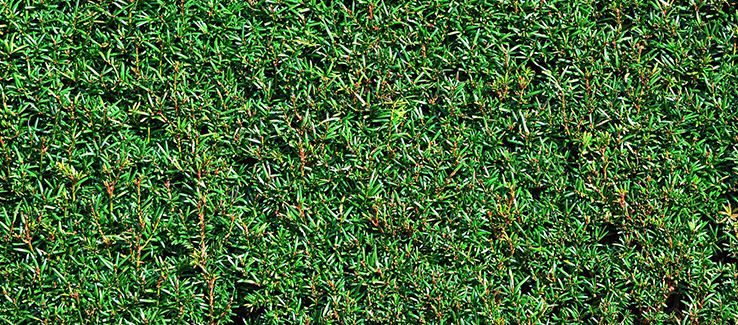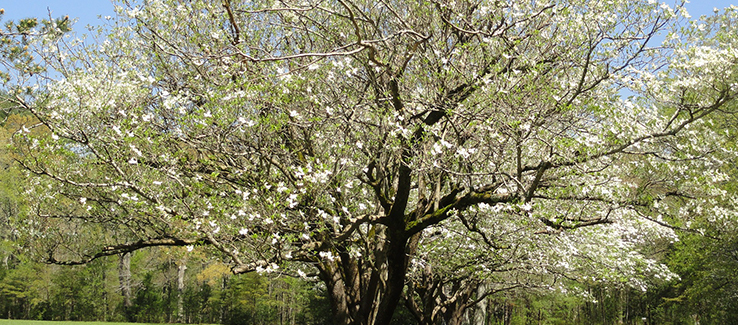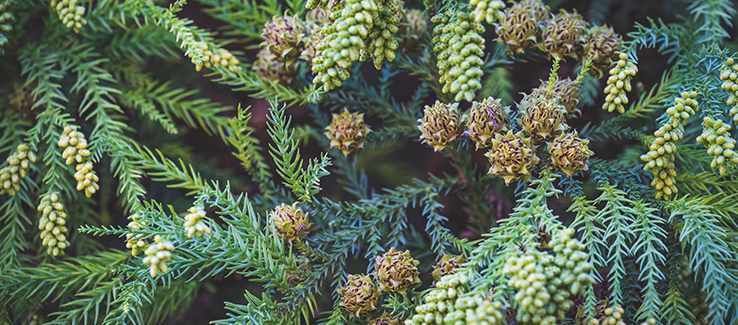
Prevent your nosy neighbor from invading your home’s privacy and outdoor space. Knowing which privacy trees to plant along your property line will help you protect your loved ones’ privacy.
fasttreeremovalatlanta.com gathered the following species, size, planting, and soil information for some of the most popular privacy trees.
What is the Best Tree for Privacy?
Many would vigorously claim that arborvitae is the best and most commonly used privacy tree. This species grows tall and forms a solid wall when planted close together. Arborvitae is among the best privacy trees and is one of the hardiest. Consider the following tree species for a privacy screen:
1. Arborvitae (Thuja)

Arborvitae is most often available as a variety of Thuja occidentalis but can also be found as varieties of Thuja plicata or Platycladus orientalis. This evergreen species most often grows as conical- or cylindrical-shaped small trees coming in various shades of green.
Mature Height – Arborvitae can reach heights between 40 and 60 feet with a spread of 10 to 15 feet.
Planting Tips – The recommended time to plant arborvitae trees is either after the last frost in spring or in the fall before the ground hardens.
Soil Recommendation – Arborvitae thrives in moist, well-drained soil in full sun or partial shade. This species grows best in slightly acid to moderately alkaline soil ranging from a 6.5 to 8.0 pH.
Hardiness Zone – 2 through 8
2. Leyland Cypress (Cupressus × leylandii)

This vigorous tree species has pleasing green or blue-green foliage sprays composed of soft scale-like needles. The typical leaf blade length on a Leyland Cypress is approximately 2 inches.
Mature Height – Leyland Cypress trees can typically reach heights between 60 and 70 feet with a spread of 15 to 20 feet.
Planting Tips – Avoid planting your trees on your property line. This fast-growing, massive tree species can quickly grow onto your neighbor’s property.
Soil Recommendation – Leyland cypress trees prefer an area with well-drained soil that receives full sunlight to partial shade. This species grows best in slightly acid to moderately alkaline soil ranging from a 5.0 to 8.0 pH.
Hardiness Zone – 6 through 10
3. Flowering Dogwood (Cornus florida)

Flowering dogwood is a small to medium understory tree species native throughout most of the eastern United States. White, red, or pink flowering bracts bloom before the leaves emerge in early spring. Intense green summer foliage turns brilliant reddish-purple in the fall.
Mature Height – With proper planting and care, a flowering dogwood can reach 40 feet in height with a spread of 60 to 80 feet.
Planting Tips – The recommended time to plant white dogwoods is in the spring, while the soil is moist and before seasonal tree growth begins.
Soil Recommendation – Dogwoods thrive in a variety of climates and soil conditions. This species grows best in well-drained, humus-rich soil and prefers acid to neutral soil ranging from 5.5 to 7.0 pH.
Hardiness Zone – 5 through 9
4. Japanese Cedar (Cryptomeria japonica)

The Japanese cedar is often used for reforestation, for gardens, as privacy screens, and as street trees. This species is renowned for its fragrant, reddish-brown wood used to build ships, houses, and furniture.
Mature Height – This tree species will grow 50 to 80 feet tall with a spread of 20 to 30. When planted under the right conditions and cared for, heights of 100 to 125 feet are possible.
Planting Tips – Select a planting location with good air circulation to help the tree fight diseases like leaf blight. Avoid sites that are exposed to strong winds or severe weather.
Soil Recommendation – Japanese cedars are adaptable to clay, loam, and sandy soils but prefer moist, well-drained acidic soils with a pH ranging between 5.5 and 7.2. This species grows best in full sun to light shade.
Hardiness Zone – 5 through 8
5. Weeping Willow (Salix babylonica)

Willows are tall, deciduous trees. The tree’s smaller branches are flexible like reeds allowing slight breezes to set the entire tree in a flowing motion. Willow leaves are slender and oval-shaped.
Mature Height – Weeping willows easily reach 30 to 80 feet in height with a 20 to 35-foot spread.
Planting Tips – Weeping willows have very long and imposing roots. Avoid planting this species near underground power lines or sewers.
Soil Recommendation – Plant willows in a site that receives full sun to partial shade, with moist, well-draining, slightly acidic (5.0 to 6.0 pH) soil.
Hardiness Zone – 4 through 10
6. Hybrid Poplar (Populus x canadensis)

Hybrid poplars are fast-growing trees (up to 8 feet per year). This species has silvery-green leaves and a broad shade-tree shape. Hybrid poplars are typically planted as fast-growing shade trees.
Mature Height – This species can reach heights between 40 and 50 feet with a spread of about 30 feet.
Planting Tips – When planting as a privacy screen, space your poplars four feet apart in a single row.
Soil Recommendation – This species thrives in moist to wet soil with a pH ranging from 5.5 to 7.5.
Hardiness Zone – 3 Through 8
7. Yew (Taxus baccata)

Often classified as a bush or shrub, yews have rich, dark-green foliage. The branches are either erect or spreading and are closely covered with flattened, linear leaves. The foliage typically appears with two yellowish bands along the underside.
Mature Height – Yews can reach heights between 4 and 60 feet with a spread of 20 feet.
Planting Tips – In spring, plant your yew around the beginning of April when there is no more frost. In autumn, plant in September to allow your yew to take root before winter.
Soil Recommendation – This species tolerates multiple soil types as long as the soil has good drainage and a pH between 5.0 and 8.0.
Hardiness Zone – 4 through 8
Fast Growing Privacy Trees
In this article, you discovered essential species, size, planting, and soil information for some of the most popular and fastest-growing privacy trees.
Planting privacy trees allows you to go about your personal life without having to worry if your neighbors are watching your every move. These trees also provide shade and protection from severe weather.
Ignoring the need for Privacy trees leaves your friend’s and family’s personal activities out in the open for curious wandering eyes to see.
Sources:
content.ces.ncsu.edu/leyland-cypress
plants.ces.ncsu.edu/plants/thuja-occidentalis/
mortonarb.org/plant-and-protect/trees-and-plants/flowering-dogwood/
hgic.clemson.edu/factsheet/japanese-cryptomeria/
bellarmine.edu/faculty/drobinson/weepingwillow.asp
arborday.org/trees/treeguide/TreeDetail.cfm?ItemID=908
edis.ifas.ufl.edu/publication/ST624
(404) 220-9965
(404) 220-9963
To view the orignal version of this post, visit: https://www.fasttreeremovalatlanta.com/7-best-trees-for-year-round-privacy

 Cool breeze wafts gently through the air. The sweat that flows down your brow indicates the characteristic humidity of an Atlanta summer. Despite the heat, you want to enjoy the cool breeze in your backyard. Shade trees are the perfect solution to this conundrum. Besides providing shade on a humid summer day, shade trees also increase a property’s value, improve landscape, and reduce soil erosion. There are certain shade tree species that thrive in Atlanta, Georgia: Crape Myrtle, River Birch, Weeping Willow, Sycamore, and Sweet Gum to name a few. Read below to learn characteristics about the various species, and talk to our tree specialist
Cool breeze wafts gently through the air. The sweat that flows down your brow indicates the characteristic humidity of an Atlanta summer. Despite the heat, you want to enjoy the cool breeze in your backyard. Shade trees are the perfect solution to this conundrum. Besides providing shade on a humid summer day, shade trees also increase a property’s value, improve landscape, and reduce soil erosion. There are certain shade tree species that thrive in Atlanta, Georgia: Crape Myrtle, River Birch, Weeping Willow, Sycamore, and Sweet Gum to name a few. Read below to learn characteristics about the various species, and talk to our tree specialist  Weeping Willow - The Weeping Willow is one of the most common and intriguing shade tree varieties. With more than 400 varieties, the Weeping Willow provides you with several options. Most Weeping Willows grow to a maximum of 40 feet tall. Weeping Willows thrive in a pH of 6 to 8. They are often found near rivers, but are highly adaptable. However, you must be careful when planting this tree. It has an expansive root system that overtakes the surrounding soil in a very wide radius. It is, therefore, best for a Weeping Willow to be planted far away from homes and roadways.
Weeping Willow - The Weeping Willow is one of the most common and intriguing shade tree varieties. With more than 400 varieties, the Weeping Willow provides you with several options. Most Weeping Willows grow to a maximum of 40 feet tall. Weeping Willows thrive in a pH of 6 to 8. They are often found near rivers, but are highly adaptable. However, you must be careful when planting this tree. It has an expansive root system that overtakes the surrounding soil in a very wide radius. It is, therefore, best for a Weeping Willow to be planted far away from homes and roadways.